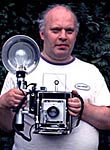|
|
 
|
|
Author
|
Topic: Electrical Safety question
|
|
|
|
|
|
|
|
|
|
|
|
|
|
|
|
|
|
|
|
|
|
|
|
|
Stephen Furley
Film God

Posts: 3059
From: Coulsdon, Croydon, England
Registered: May 2002
|
 posted 06-10-2008 12:50 PM
posted 06-10-2008 12:50 PM




quote: Fred Tucker
the code changed to allow for this safely.
I doubt that there's actually any safety issue here, though it may be required by regulations which claim to be on grounds of safety.
In the roughly half of he world which has a single phase Voltage of around 240V dryers, cooks etc have lamps, moters, electro-mechanical timers etc. operating on 240V without large numbers of people being killed by them. At one time there was probably an issue of being able to use standard, readily available, parts, but these days the same factory, probably in China, is likely to be making components for use in many different countries, with different Voltages. Also, these days things like timers are likely to be electronic devices operating on a few Volts d.c., and this could be derived just as well from 240V as from 120V, so there's probably no great advantage in having a neutral available these days. There is an advantage to 120V for small incandescent lamps are concerned, and 120V ones are certainly more readily available in the US than 240V ones, but I doubt that it's really a safety issue. You could always use a 12V halogen lamp.
| IP: Logged
|
|
|
|
|
|
All times are Central (GMT -6:00)
|
|
Powered by Infopop Corporation
UBB.classicTM
6.3.1.2
The Film-Tech Forums are designed for various members related to the cinema industry to express their opinions, viewpoints and testimonials on various products, services and events based upon speculation, personal knowledge and factual information through use, therefore all views represented here allow no liability upon the publishers of this web site and the owners of said views assume no liability for any ill will resulting from these postings. The posts made here are for educational as well as entertainment purposes and as such anyone viewing this portion of the website must accept these views as statements of the author of that opinion
and agrees to release the authors from any and all liability.
|

 Home
Home
 Products
Products
 Store
Store
 Forum
Forum
 Warehouse
Warehouse
 Contact Us
Contact Us




 Printer-friendly view of this topic
Printer-friendly view of this topic















